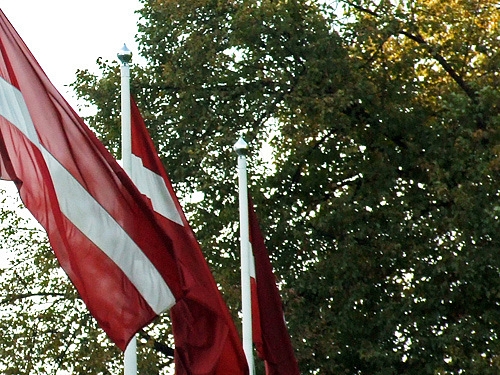About Latvia
Latvia – in the center of Baltic
The Republic of Latvia is located in northeastern Europe. It is washed by the Baltic Sea and the Gulf of Riga. In the north Latvia borders Estonia, in the east – Russia, in the southeast – Belarus, and in the south – Lithuania. The total length of the land border is 1368 km, and the sea border – 498 km. The capital of Latvia – Riga is the largest city in the Baltic States.
National economy
* In the 1990s a free market economy, a pre-condition for economic growth, started functioning in Latvia.
* The nation’s economic development priorities are mostly based on the geographical location of the state in the centre of the Baltic States, being a gateway between the western and eastern markets.
* Latvia is a member-state of significant international organizations, which guarantees investors political and economic stability.
* The government of Latvia set a goal to introduce euro in Latvia in 2014.
* The largest foreign trading partners of Latvia are Lithuania, Estonia, Russia and Germany.
* In 2008 a serious economic crisis started in Latvia, resulting in substantially reduced education, health care and social budgets. By the end of the year the international lenders granted Latvia a loan of EUR 7,5 billion EUR.
* 2011 was marked by a gradual increase in economic indicators.
* Increased unemployment and falling incomes made many people migrate to Western Europe in search of work.
* The most rapidly growing and promising economic sectors of Latvia include forestry, ecological food product manufacturing, transport services, as well as chemical and pharmaceutical industries.
* The international airport Riga has become the largest air traffic junction in the Baltic States, but the national airline airBaltic offers direct flights from the capital cities of all three Baltic States.
Participation in the international organizations:
* On September 18th, 1991 Latvia became a United Nations member state.
* On March 29th, 2004 Latvia joined the North-Atlantic Treaty Organization (NATO).
* On May 4th, 2004 Latvia became a member state of the European Union.
* On December 21st, 2007 Latvia and other EU member states, which joined in 2004, joined the Schengen Agreement.
* Latvia is a member of the World Trade Organization.
The system of government
* Latvia is a parliamentary republic, in which President is a head of the State, and the supreme executive power belongs to the Prime Minister and the Cabinet.
* The supreme legislative power is the parliament (Saeima), composed of 100 deputies, who are elected by people for 4 years in general, equal, direct, closed and proportional elections.
* The main political parties in the political system of Latvia are centrist and right wing political forces, however during last years the power of left-wing parties has enhanced as well. Five political parties or alliances are represented in the 11th Saeima. Local-government deputies in Latvia are elected every four years. The most recent Saeima elections took place on September 17, 2011 (they were extraordinary elections after the 10th Saeima was dismissed), and local-government elections – on June 6th, 2009.
History
* Around 2000 B.C., the first Baltic tribes entered the land. Latvian is one of the Baltic languages; it belongs to the Indo-European family of languages. Due to its strategically beneficial geographical location by the sea, the territory of Latvia went through various conquests – it belonged to Germans, Poles, Swedes and Russians.
* After the continuous period of foreign domination, on November 18th, 1918, the independent and democratic Republic of Latvia was proclaimed. However on June 17th, 1940 the Soviet Army occupied Latvia. On August 5th, 1940 Latvia was incorporated into the USSR.
In 1941 and 1949 a total of 60 000 persons were deported from Latvia to Siberia. Migrants from Russia and other parts of the USSR who settled in Latvia – starting a gradual russification of the country, replaced them.
This had a substantial impact on the ethnic and social structure of the population of the nation. At the end of the 1930s, 77% of the population were Latvians, but by 1989 – only 52%.
* On May 4th, 1990 the Declaration for restoring the independence of the Republic of Latvia was adopted, providing for a transitional period. On August 21st, 1991 a Constitutional Law on full independence of the Republic of Latvia was adopted in the midst of a coup against the government of the Soviet leader, Mikhail Gorbachev.
Nature
* Latvians are proud of the natural beauty of their nation, which can be enjoyed in various nature parks and reserves.
* The greatest natural wealth is forests: forestland covers almost half of the territory of the country – 29 555 km2, 54% of the trees growing in forests are deciduous and 46% – coniferous.
* White sand beaches ensure the status of Latvia as a Baltic resort. The country also boasts around 3000 lakes.
* Latvia has well-cared-for and clean environment, where an extensive fauna thrives. Around 14 000 different animal species are officially registered.
Culture and sport
* Riga is an ancient hanseatic city, famous for its rich Jugendstil architecture, and is included in the UNESCO world heritage list.
In 2001 the city celebrated its 800th anniversary, and in 2014 it will be a capital city of European culture.
* Latvians can be proud of their cultural heritage – every five years several tens of thousands singers and dancers gather at the Song and Dance Festival (next one is schedule for 2013); the folklore heritage, which is represented by Latvian Folk Songs (Dainas) is included in the UNESCO program Memory of the World registers. And every day many members of the public and visitors to Riga visit theatres, opera and concert halls.
* Latvian pop-rock group Brainstorm is famous worldwide. In 2002, with her international stage name Marie N, Latvian singer Marija Naumova won the Eurovision Song Contest in Tallinn, an impressive victory, performing her self-composed song I Wanna.
* In the classical music, the name of Latvia is brought into repute by such world-class opera stars as Inese Galante and Elīna Garanča, Latvian pianist Vestards Šimkus. Outside Latvia, in particular in Russia, songs of Latvian composer Raimonds Pauls are often performed. Alvis Hermanis is an internationally recognized and famous Latvian theatre director, who has staged performances in the theatres of Germany, Russia, Switzerland and other countries.
* Latvia is popularized by its sports stars – at the world championships and Olympic games Latvian hockey players are inexhaustible, in the National Basketball Association Latvia was represented by basketball players Gundars Vētra and Andris Biedriņš, in the Women’s National Basketball Association – by Zane Tamane and Anete Jēkabsone-Žogota. In 2008 Māris Štrombergs became an Olympic champion in cycling (BMX), Latvian tennis players Ernests Gulbis and Anastasija Sevastova are well-known at the world level, the name of Latvia is bought into repute worldwide by the European and World Champion in weightlifting Viktors Ščerbatihs, the world champion skeletonist Martins Dukurs and others.
General Information about Latvia
Name: | Republic of Latvia. |
Platība: | 64’559 km2, of which land 62’157 km2, and inland waters – 2’402 m2. |
Population: | 2,07 million (of which 68% in cities, 32% in rural areas). The population has decreased over the past 11 years by 309 000 or by 13%, with more than half (190 000) emigrating. 64% of the population is of working age, 57,5% is economically active. 62,1% are ethnic Latvians. The second largest ethnic group is Russians, who make up 26.9% of the population. More than 170 nationalities live in Latvia. |
Capital city: | Riga (one third of the inhabitants of the State live there – 705,7 thousand). |
Largest cities: | Daugavpils (103,1 thousand inhabitants), Liepaja (83,9 thousand), Jelgava (64,7 thousand), Jurmala (56,1 thousand), Ventspils (42,7 thousand). |
Administrative division: | in Latvia there are 110 counties and 9 cities of republican importance. |
Basic law: | Constitution adopted in 1922. |
Government: | parliamentary republic, with the supreme executive power belonging to the Minister President and the Cabinet, and the legislative power to the Parliament (Saeima), composed of 100 deputies. |
Head of the State: | president. |
Currency: | Latvian lat is pegged to euro, 1 lat = 100 centimes;1 lat = 1,42 euro. |
Most significant national holidays: | January 1st – New Year’s Day; March or April – Easter; May 1st – Day of Convocation of the Constituent Assembly of the Republic of Latvia; May 4th – Declaration of Independence of the Republic of Latvia; Second Sunday in May – Mother’s Day; June 23rd – Ligo Day; June 24th – Janis Day; November 18th – Proclamation of the Republic of Latvia; December 24–26th – Christmas; December 31st – Old Year’s Day. |
Language: | national language – Latvian, however Russian is very important too. |
National flag: | red-white-red; it is one of the oldest in the world and its origin dates back to the 13th century. |
Education: | basic, secondary and higher (first two levels are ensured by the State). More than 90% of children attend state-owned schools. |
Religion: | 37% of the population in Latvia belongs to a certain religion. In 2008 the largest religious groups in Latvia were Catholics (37%), Lutherans (34%) and Orthodox believers (27%). |
Minerals: | sand, sand and gravel mixture, peat, dolomite. |
Time zone: | December – March: GMT + 2 hours (winter time); April – November: GMT + 3 hours (summer time). |
Electricity: | 220V / 50 Hz |
State code in the global network: | .lv |
GSM: | 900 / 1800 |
International telephone code: | +371 |
Number of fixed telephone line subscribers: | 532 thousand (2010, International Telecommunication Union) |
Number of mobile telephone subscribers: | 2,31 million (2010, International Telecommunication Union) |
Number of users of the global network: | 73,4% of all inhabitants of Latvia (2011). |
Living costs: | Capital of Latvia – Riga is the 88th expensive city worldwide (Mercer Human Resource Consulting data for 2011).. |
Representation: | in Latvia there reside the embassies of 35 states, the Embassy of the Sovereign Military Hospitaller Knights Order of Malta, as well as general consulates of 2 states and representative offices of 8 international organizations, and the Republic of Latvia has 35 embassies, 6 permanent representative offices, 1 general consulate and 2 consulates abroad. |
Call in case of emergency: | All Emergency Services 112 Fire and Rescue Service 01, 112 Police 02, 110, 112 Emergency 03, 112, 113 Gas Service 114
|
Distance (by land transport, from one city centre to another) from Riga to: | Tallin 310 km Vilnius293 km Moscow 935 km Minsk 480 km Warsaw 693 km Berlin1122 km |
Flight duration from Riga to: | Tallin 55 min Vilnius 55 min Moscow 1 hour 40 min Minsk1 hour 15 min Stokholm 1 hour 20 min Frankfurt 2 hours 15 min London 2 hours 50 min Rome 3 hours |
Climate: | Latvia has moderate climate, in the territory of the republic the influence of the sea is felt all year long. The result – much cloudiness, short sun shining periods, air temperature lower than that on latitude on average. There are four seasons in Latvia.In 2011, the average temperature was +7,3°C. |
More information about Latvia
*State Agency of Tourism Development
*Investment and Development Agency of Latvia
Photo: Pilseta24.lv





